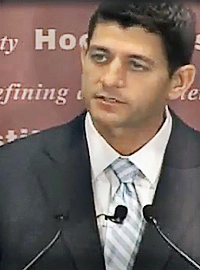| Paul Ryan Would Replace ObamaCare with Patient-Centered Reform |
 |
|
By Ashton Ellis
Thursday, September 29 2011 |
Rep. Paul Ryan’s recent speech at the Hoover Institution laid out a comprehensive alternative to ObamaCare that takes a patient-centered approach to controlling skyrocketing health care costs. So far, it is the most detailed plan available for a conservative movement looking to counter the biggest government power grab since the 1960s. Building on his Path to Prosperity budget resolution passed by the House of Representatives in April, Ryan added a third reform to his proposals for Medicare (premium support) and Medicaid (block grants), making health insurance as portable as a 401(k) plan. Along with Medicare and Medicaid, Ryan noted that “our current tax code provides additional fuel for runaway health care inflation. Under current law, employer-sponsored health insurance plans are entirely exempt from taxation, regardless of how much an individual contributes to their policy.” The result is to tilt “the compensation scale toward benefits, which are tax-free, and away from higher wages, which are taxable.” It’s easy to see why high earners would prefer tax-free benefits to higher rates of taxable income. It’s equally obvious that excessively high tax rates distort compensation packages to force consumption of a service that, over time, drives up costs across-the-board. As with Medicare and Medicaid, Ryan’s health insurance solution empowers the end-user – not some bureaucratic middle man – to make important decisions. According to Ryan, there are two models for controlling the increasing costs of healthcare. One is dictated by government; the other by patients empowered to make market decisions. The government model is enshrined in ObamaCare’s creation of the Independent Payment Advisory Board (IPAB). IPAB is a panel of 15 “experts” with authority to decide which procedures and medications to pay for and how much. It treats patients and healthcare providers as pawns in the yearly struggle to hold down spending. The patient-empowerment model retains familiar programs like Medicare and Medicaid, but changes their incentive structures to increase transparency and reduce costs. (Medicare guarantees coverage for almost all procedures, but caps payment at an arbitrary level that does not reward superior care at lower costs. Medicaid is a limitless matching program that tempts states to devise ways to maximize receipt of federal dollars while crowding out other budget items.) Ryan’s reforms change the incentive structures. Unlike ObamaCare’s prescription of mandates and less care, Ryan’s plan moves the health care industry into a true market. Costly middle men in government and big insurance companies are eliminated, allowing patients and doctors to clearly and openly discuss the price of services. States are encouraged to design programs that fit their citizens instead of rigging the process to capture more federal dollars. Assuming Ryan’s call for lowering tax rates is passed into law, making health insurance portable frees firms and employees from pushing raises into benefits instead of straight salary (which in turn creates more capital to invest and save). The timing of Ryan’s speech could not have been better. The day before Ryan spoke at Hoover, Obama’s Department of Justice failed to request a rehearing by the 11th Circuit of two previous rulings that ObamaCare’s individual mandate is unconstitutional. Since the 11th Circuit is populated by a majority of conservative judges, the likelihood of reversing the earlier decisions was close to nil. So instead of wasting time, the White House seems to be opting for a fast-track to the Supreme Court. If successful, the Court could render a decision next summer in the heat of the presidential campaign. If that happens, expect health care policy – and the philosophical arguments that animate it – to join with the economy and job creation as the campaign’s biggest issues. The Republican presidential nominee would do well to include Ryan’s reforms in the party’s platform. Obama and Ryan have two competing visions of America’s future. It is critical that the GOP nominee put those distinctions into focus. |
Related Articles : |
























